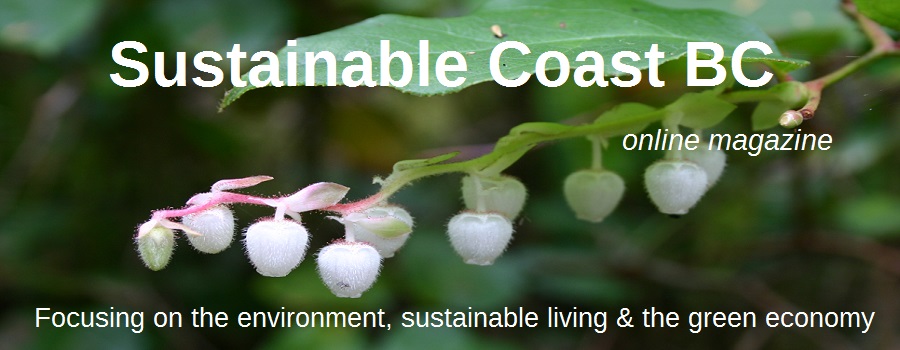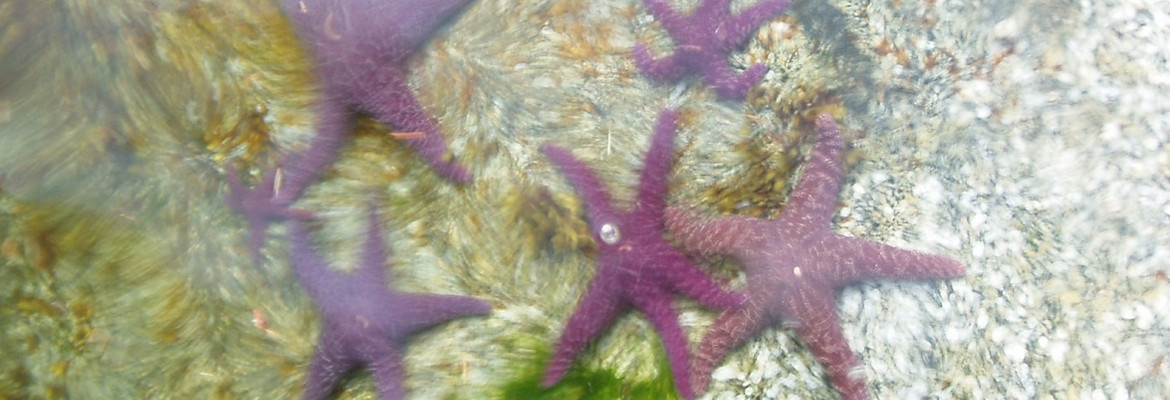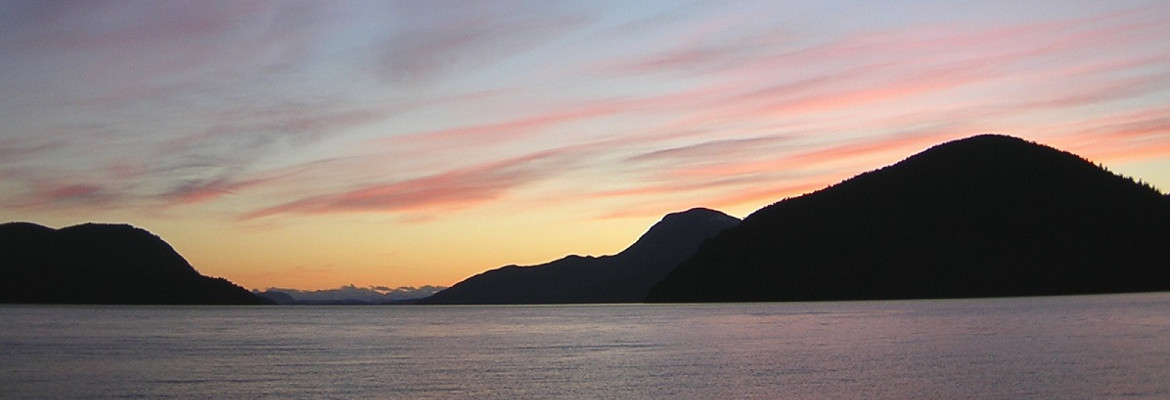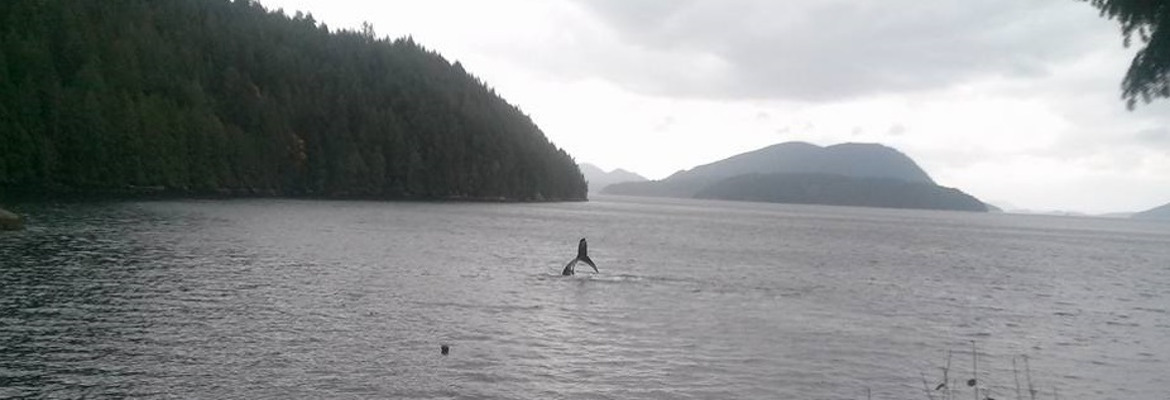Sustainable Coast BC Views: Whale's Tail, Sea Stars, Jervis Inlet Sunset © bdsaunders
Sustainable Values - The New Economy Part 2
- Details
- Category: Current Users Current Users
- Published: 15 February 2010 15 February 2010
The New Economy
[important title=Part 2 of 3] In a three-part series, columnist Loys Maingon gives us an oveview of the New Economy and a Sunshine Coast reality check.[/important]
The difficulty many people have in understanding what “The New Economy” is, or will be, is compounded by the way that The New Economy is intimately linked to the concept of “sustainability.”
Not so Trivial Trivia
- Details
- Category: Uncategorised Uncategorised
- Published: 15 February 2010 15 February 2010
Did you know?
The average Canadian has an Ecological Footprint of 6.9 hectares. Three times the average of other citizens of the earth. ( your Ecological Footprint is a measure of the biologically productive area needed to produce the resources you use and the area to absorb the waste you generate) .We do not have enough planets to sustain us!
New citizens group forms on the Sunshine Coast
- Details
- Written by Administrator Administrator
- Category: Uncategorised Uncategorised
- Published: 12 February 2010 12 February 2010
SuCESS media release, January 18, 2010
"We had a fantastic response to our initial announcement ad last week," stated Peter MacKay, executive director. "We have now formed a non-profit society and hope to get participation from residents up and down the coast from Port Mellon to Egmont."
What is "zero waste"?
- Details
- Written by Administrator Administrator
- Category: FAQs FAQs
- Published: 05 February 2010 05 February 2010
Zero waste is a philosophy that encourages the redesign of resource life cycles so that all products are reused. Any trash sent to landfills is minimal. The process recommended is one similar to the way that resources are reused in nature.
Zero Waste is a goal that is both pragmatic and visionary, to guide people to emulate sustainable natural cycles, where all discarded materials are resources for others to use. Zero Waste means designing and managing products and processes to reduce the volume and toxicity of waste and materials, conserve and recover all resources, and not burn or bury them. Implementing Zero Waste will eliminate all discharges to land, water or air that may be a threat to planetary, human, animal or plant health.
In industry this process involves creating commodities out of traditional waste products, essentially making old outputs new inputs for similar or different industrial sectors. An example might be the cycle of a glass milk bottle. The primary input (or resource) is silica-sand, which is formed into glass and then into a bottle. The bottle is filled with milk and distributed to the consumer. At this point, normal waste methods would see the bottle disposed in a landfill or similar. But with a zero-waste method, the bottle can be saddled at the time of sale with a deposit, which is returned to the bearer upon redemption. The bottle is then washed, refilled, and resold. The only material waste is the wash water, and energy loss has been minimized.
Zero waste can represent an economical alternative to waste systems, where new resources are continually required to replenish wasted raw materials. It can also represent an environmental alternative to waste since waste represents a significant amount of pollution in the world
The old approach to dealing with waste (garbage) has created many environmental and economic problems on the Sunshine Coast. This is one of the areas where our elected officials and regional staff are not providing leadership, in spite of making committments to embrace this goal. Find out more about changing the strategy to resource recovery and the "ZERO waste" movement:
- Target Zero Canada
- The Story of Stuff with Annie Leonard
- ZW principles, The Zero Waste Institute
- Zero Waste FAQs, The Zero Waste Institute
- Zero Waste Systems with Eric Lombardi.
- Zero Waste Basics, Grass Roots Recycling Network
What is a resource recovery centre?
- Details
- Written by Administrator Administrator
- Category: FAQs FAQs
- Published: 05 February 2010 05 February 2010
A resource recovery centre, sometimes called a park, is a centralized location that houses all the components of the cradle to cradle recovery system of Zero waste.
At a park there would be the drop off area to take in waste and recyclable materials. There would also be an area where the materials are separated into reusable materials. Finally, business that reuse those materials to make a new product would be located in the park. There would also be a composting site and maybe even a community garden in some plans Ideally, very little would be landfilled.
link to resource recovery park plan: http://richardanthonyassociates.com/presentations/zwc_sd_2007.ppt#27
Sustainable Values - The New Economy Part 1
- Details
- Written by Administrator Administrator
- Category: Current Users Current Users
- Published: 03 February 2010 03 February 2010
The New Economy
[important title=Part 1 of 3] In a three-part series, columnist Loys Maingon gives us an oveview of the New Economy and a Sunshine Coast reality check.[/important]When the ad announcing the formation SuCESS came out, new members asked what “The New Economy” is. They had heard the words, but like most political white-noise, no-one had really taken the time to explain them.Direct Disposal dumps waste on Sechelt Band land
- Details
- Written by Beverly Saunders Beverly Saunders
- Category: News News
- Published: 02 February 2010 02 February 2010
Two trucks owned by Direct Disposal Corporation of Sechelt were observed dumping a mixed load of waste at the Tymax and Coastland Wood Industries green waste site on Sechelt Inlet Road in Sechelt. The property is on land owned by the Sechelt Band.
SCRD Not Required to Follow Public Wishes on Landfill, Says Shugar
- Details
- Written by Administrator Administrator
- Category: News News
- Published: 02 February 2010 02 February 2010
When a speaker at the Jan. 19 meeting on the fate of the Pender landfill asked Sunshine Coast Regional District (SCRD) Sustainable Services Manager Dion Whyte if there was one good thing he could say about keeping the landfill going, Whyte thought for a moment then said, "It would please a lot of people in this room."



